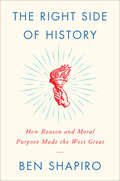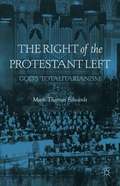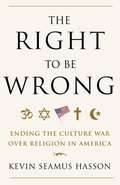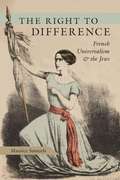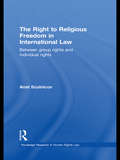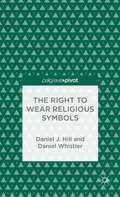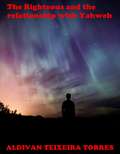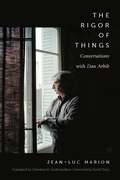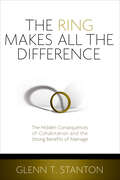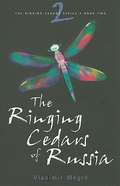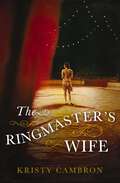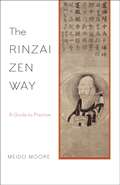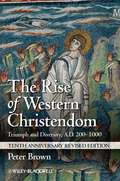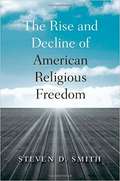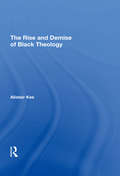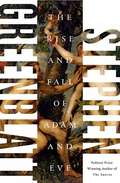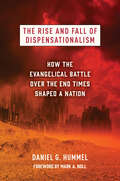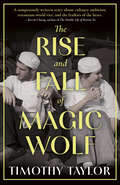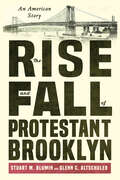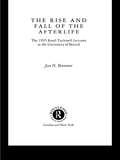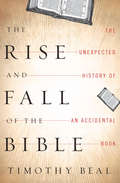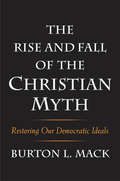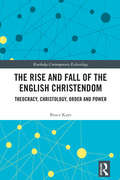- Table View
- List View
The Right Side of History: How Reason and Moral Purpose Made the West Great
by Ben ShapiroAmerica has a God-shaped hole in its heart, argues New York Times bestselling author Ben Shapiro, and we shouldn't fill it with politics and hate. <P><P>In 2016, Ben Shapiro spoke at UC Berkeley. Hundreds of police officers were required from 10 UC campuses across the state to protect his speech, which was -- ironically -- about the necessity for free speech and rational debate. He came to argue that Western Civilization is in the midst of a crisis of purpose and ideas. Our freedoms are built upon the twin notions that every human being is made in God’s image and that human beings were created with reason capable of exploring God’s world. We can thank these values for the birth of science, the dream of progress, human rights, prosperity, peace, and artistic beauty. <P><P>Jerusalem and Athens built America, ended slavery, defeated the Nazis and the Communists, lifted billions from poverty and gave billions spiritual purpose. Jerusalem and Athens were the foundations of the Magna Carta and the Treaty of Westphalia; they were the foundations of Declaration of Independence, Abraham Lincoln’s Emancipation Proclamation, and Martin Luther King Jr.’s Letter from Birmingham Jail.Civilizations that rejected Jerusalem and Athens have collapsed into dust. <P><P>The USSR rejected Judeo-Christian values and Greek natural law, substituting a new utopian vision of “social justice” – and they starved and slaughtered tens of millions of human beings. The Nazis rejected Judeo-Christian values and Greek natural law, and they shoved children into gas chambers. Venezuela rejects Judeo-Christian values and Greek natural law, and citizens of their oil-rich nation have been reduced to eating dogs. We are in the process of abandoning Judeo-Christian values and Greek natural law, favoring instead moral subjectivism and the rule of passion. And we are watching our civilization collapse into age-old tribalism, individualistic hedonism, and moral subjectivism. We believe we can reject Judeo-Christian values and Greek natural law and satisfy ourselves with intersectionality, or scientific materialism, or progressive politics, or authoritarian governance, or nationalistic solidarity. We can’t. <P><P>The West is special, and in The Right Side of History, Ben Shapiro bravely explains that it’s because too many of us have lost sight of the moral purpose that drives us each to be better, or the sacred duty to work together for the greater good, or both. A stark warning, and a call to spiritual arms, this book may be the first step in getting our civilization back on track. <P><b>A New York Times Bestseller</b>
The Right of the Protestant Left
by Mark Thomas EdwardsWhile serving as an introduction to ecumenical liberal Protestantism and the social gospel over the course of the twentieth-century this book also highlights certain totalitarian as well as more fundamental conservative tendencies within those movements.
The Right to Be Wrong: Ending the Culture War Over Religion in America
by Kevin Seamus HassonIn the running debate we call the "culture wars," there exists a great feud over religious diversity. One side demands that only their true religion be allowed in the public square; the other insists that no religions ever belong there. The Right to Be Wrong offers a solution, drawing its lessons from a series of stories--both contemporary and historical--that illustrates the struggle to define religious freedom. The book concludes that freedom for all is guaranteed by the truth about each of us: Our common humanity entitles us to freedom--within broad limits--to follow what we believe to be true as our consciences say we must, even if our consciences are mistaken. Thus, we can respect others' freedom when we're sure they're wrong. In truth, they have the right to be wrong.
The Right to Difference: French Universalism and the Jews
by Maurice SamuelsUniversal equality is a treasured political concept in France, but recent anxiety over the country's Muslim minority has led to an emphasis on a new form of universalism, one promoting loyalty to the nation at the expense of all ethnic and religious affiliations. This timely book offers a fresh perspective on the debate by showing that French equality has not always demanded an erasure of differences. Through close and contextualized readings of the way that major novelists, philosophers, filmmakers, and political figures have struggled with the question of integrating Jews into French society, Maurice Samuels draws lessons about how the French have often understood the universal in relation to the particular. Samuels demonstrates that Jewish difference has always been essential to the elaboration of French universalism, whether as its foil or as proof of its reach. He traces the development of this discourse through key moments in French history, from debates over granting Jews civil rights during the Revolution, through the Dreyfus Affair and Vichy, and up to the rise of a "new antisemitism" in recent years. By recovering the forgotten history of a more open, pluralistic form of French universalism, Samuels points toward new ways of moving beyond current ethnic and religious dilemmas and argues for a more inclusive view of what constitutes political discourse in France.
The Right to Religious Freedom in International Law: Between Group Rights and Individual Rights (Routledge Research In Human Rights Law Ser. #2)
by Anat ScolnicovThis book analyses the right to religious freedom in international law, drawing on an array of national and international cases. Taking a rigorous approach to the right to religious freedom, Anat Scolnicov argues that the interpretation and application of religious freedom must be understood as a conflict between individual and group claims of rights, and that although some states, based on their respective histories, religions, and cultures, protect the group over the individual, only an individualistic approach of international law is a coherent way of protecting religious freedom. Analysing legal structures in a variety of both Western and Non-Western jurisdictions, the book sets out a topography of different constitutional structures of religions within states and evaluates their compliance with international human rights law. The book also considers the position of women's religious freedom vis-à-vis community claims of religious freedom, of children’s right to religious freedom and of the rights of dissenters within religious groups.
The Right to Wear Religious Symbols
by Daniel J. Hill Daniel WhistlerClearly presenting the case-law concerning Article 9 of the European Convention of Human Rights, this is a lively and accessible analysis of a key issue in contemporary society: whether there is a human right to wear a religious symbol and how far any such right extends.
The Right, the Good and the Happy: The Christian in a World of Distorted Values
by Bernard L. Ramm[from inside flaps] "Why have drugs replaced beer, cigarettes, and even hamburgers in the life of the young person? What should be done about the large number of living dead--human vegetables who are kept alive through machines? Is it right to postpone the inevitable? Why should any woman in the twentieth century want or need an abortion? Should there never be abortion? Should there be abortion on request? Does the implantation of an organ from the body of one person to another create a crisis of identity in the person who has the transplant? * When is a person actually dead? * Who should receive the transplant--an unknown or a prominent community personality? Does the individual have the right to decide if a war is just or not and have his decision honored by the government? Can atomic war ever be considered a just war? In the technological age a man may live two hundred years. If there is work enough to last him only to age thirty, what is he supposed to do for the next 170 years? All of these situations demand ethical decisions. Should the Christian's choice, in any of these matters, be more realistic or more compassionate than that of any other person? Dr. Bernard L. Ramm points out that if Christianity is a total way of life--and he believes that this is what the Bible teaches--then the ethical and moral character of the Christian's life must reflect the love, justice, and equity of God whom he worships. The Right, the Good and the Happy is a practical book. After dealing briefly with general ethical theory, the author concentrates on specific moral and ethical issues. But this is not a guide to easy ethical decisionmaking. Dr. Ramm presents arguments for and against a given position. Occasionally he takes sides; often he lets the reader draw his own conclusions. Traditionally, there has been a strong emphasis in the church that if a person has accepted Christ, he will almost always make right choices. But an automatic change of heart in human relations or politics or economics does not necessarily occur just because a person is converted. What should the church's message be as it seeks to lead and train Christians toward a mature ethical perspective? Dr. Ramm says that there can be only one approach if the followers of Christ are to be enriched through growth into the right, the good, and the happy life. "The church ought to follow ethical policies that are redemptive, that are healing, and that offer hope for happiness in the future.""
The Righteous and the relationship with Yahweh
by Aldivan Teixeira TorresThis tale brings practical advice in the relation with the father and encourages the optimism and the perseverance. If you is in a difficult moment ,this is the best time to read it and to restart the hopes.
The Rigor of Things: Conversations with Dan Arbib
by Jean-Luc Marion Dan ArbibIn a series of conversations, Jean-Luc Marion reconstructs a career’s path in the history of philosophy, theology, and phenomenology. Discussing such concepts as the event, the gift, and the saturated phenomenon, Marion elaborates the rigor displayed by the things themselves. He discusses the major stages of his work and offers his views on the forces that have driven his thought.The conversation ranges from Marion’s engagement with Descartes, to phenomenology and theology, to Marion’s intellectual and biographical backgrounds, concluding with illuminating insights on the state of the Catholic Church today and on Judeo-Christian dialogue. Marion also reflects on the relationship of philosophy to history, theology, aesthetics, and literature. At the same time, the book provides an account of French intellectual life in the late twentieth century. In these interviews, Marion’s language is more conversational than in his formal writing, but it remains serious and substantive. The book serves as an excellent and comprehensive introduction to Marion’s thought and work.
The Ring Makes All the Difference: The Hidden Consequences of Cohabitation and the Strong Benefits of Marriage
by Glenn T. StantonWhy not cohabitate?Many believe nothing is better for their future marriage than a trial period—cohabitation. It&’s the fastest growing family type in the U.S. So how&’s that working out? Are people truly happier?Author Glenn Stanton offers a compelling factual case that nearly every area of health and happiness is increased by marriage and decreased by cohabitation.With credible data and compassion, Stanton explores the reasons why the cohabitation trend is growing; outlines its negative outcomes for men, women, and children; and makes a case for why marriage is still the best arrangement for the flourishing of couples and society. This resource is ideal for those who are cohabitating or considering it, as well as pastors and counselors who need to be able to engage this issue.
The Ring Makes All the Difference: The Hidden Consequences of Cohabitation and the Strong Benefits of Marriage
by Glenn T. StantonWhy not cohabitate?Many believe nothing is better for their future marriage than a trial period—cohabitation. It&’s the fastest growing family type in the U.S. So how&’s that working out? Are people truly happier?Author Glenn Stanton offers a compelling factual case that nearly every area of health and happiness is increased by marriage and decreased by cohabitation.With credible data and compassion, Stanton explores the reasons why the cohabitation trend is growing; outlines its negative outcomes for men, women, and children; and makes a case for why marriage is still the best arrangement for the flourishing of couples and society. This resource is ideal for those who are cohabitating or considering it, as well as pastors and counselors who need to be able to engage this issue.
The Ringing Cedars of Russia (The Ringing Cedars Series #2)
by Vladimir Megré John Woodsworth Leonid SharashkinAfter rising rapidly to the top of national best-seller lists, first-time author Vladimir Megre has some explaining to do.
The Ringmaster's Wife
by Kristy CambronAn ounce of courage. A leap of faith. Together, they propel two young women to chase a new life--one that's reimagined from what they might have become. In turn-of-the-century America, a young girl dreams of a world that stretches beyond the confi nes of a quiet life on the family farm. With little more than her wit and a cigar box of treasures, Mable steps away from all she knows, seeking the limitless marvels of the Chicago World's Fair. There, a chance encounter triggers her destiny--a life with a famed showman by the name of John Ringling. A quarter of a century later, Lady Rosamund Easling boards a ship to America as a last adventure before her arranged marriage. There, the twenties are roaring, and the rich and famous gather at opulent, Gatsby-esque parties. The Jazz Age has arrived, and with it, the golden era of the American circus, whose queen is none other than the enigmatic Mable Ringling. When Rosamund's path crosses with Mable's and the Ringlings' glittering world, she makes the life-altering decision to leave behind a comfortable future of estates and propriety, choosing instead the nomadic life of a trick rider in the Ringling Brothers' circus. A novel that is at once captivating, deeply poignant, and swirling with exquisite historical details of a bygone world, The Ringmaster's Wife will escort readers into the center ring, with its bright lights, exotic animals, and a dazzling performance that can only be described as the Greatest Show on Earth! "Vibrant with the glamour and awe that flourished under the Big Top in the 1920s, The Ringmaster's Wife invites the reader [into] the Greatest Show on Earth." --Joanne Bischof, award-winning author of The Lady and the Lionheart
The Rinzai Zen Way: A Guide To Practice
by Meido MooreThe first accessible beginner's guide to Rinzai Zen practice.The recognition of the true nature of oneself and the universe is the aim of Rinzai Zen—but that experience, known as kensho, is really just the beginning of a life of refining that discovery and putting it into practice in the world. Rinzai, with its famed discipline and its emphasis on koan practice, is one of two main forms of Zen practiced in the West, but it is less familiar than the more prominent Soto school. Meido Moore here remedies that situation by providing this compact and complete introduction to Zen philosophy and practice from the Rinzai perspective. It’s an excellent entrée to a venerable tradition that goes back through the renowned Hakuin Ekaku in eighteenth-century Japan to its origins in Tang dynasty China—and that offers a path to living with insight and compassion for people today.
The Rise Of Western Christendom: Triumph And Diversity, A. D. 200-1000 (Making Of Europe Series #5 (Tenth Anniversary Revised Edition))
by Peter Brown<P>This tenth anniversary revised edition of the authoritative text on Christianity’s first thousand years of history features a new preface, additional color images, and an updated bibliography. The essential general survey of medieval European Christendom, Brown’s vivid prose charts the compelling and tumultuous rise of an institution that came to wield enormous religious and secular power. <br>• Clear and vivid history of Christianity’s rise and its pivotal role in the making of Europe <br>• Written by the celebrated Princeton scholar who originated of the field of study known as ‘late antiquity’ <br>• Includes a fully updated bibliography and index
The Rise and Decline of American Religious Freedom
by Steven D. SmithFamiliar accounts of religious freedom in the United States often tell a story of visionary founders who broke from the centuries-old patterns of Christendom to establish a political arrangement committed to secular and religiously neutral government. These novel commitments were supposedly embodied in the religion clauses of the First Amendment. But this story is largely a fairytale, Steven Smith says in this incisive examination of a much-mythologized subject. He makes the case that the American achievement was not a rejection of Christian commitments but a retrieval of classic Christian ideals of freedom of the church and freedom of conscience. Smith maintains that the distinctive American contribution to religious freedom was not in the First Amendment, which was intended merely to preserve the political status quo in matters of religion. What was important was the commitment to open contestation between secularist and providentialist understandings of the nation which evolved over the nineteenth century. In the twentieth century, far from vindicating constitutional principles, as conventional wisdom suggests, the Supreme Court imposed secular neutrality, which effectively repudiated this commitment to open contestation. Rather than upholding what was distinctively American and constitutional, these decisions subverted it. The negative consequences are visible today in the incoherence of religion clause jurisprudence and the intense culture wars in American politics.
The Rise and Demise of Black Theology (Reclaiming Liberation Theology Ser.)
by Alistair KeeBlack Theology emerged in the 1960s as a response to black consciousness. In South Africa it is a critique of power; in the UK it is a political theology of black culture. The dominant form of Black Theology has been in the USA, originally influenced by Black Power and the critique of white racism. Since then it claims to have broadened its perspective to include oppression on the grounds of race, gender and class. In this book the author contests this claim, especially by Womanist (black women) Theology. Black and Womanist Theologies present inadequate analyses of race and gender and no account at all of class (economic) oppression. With a few notable exceptions Black Theology in the USA repeats the mantras of the 1970s, the discourse of modernity. Content with American capitalism it fails to address the source of the impoverishment of black Americans at home. Content with a romantic imaginaire of Africa, this 'African-American' movement fails to defend contemporary Africa against predatory American global ambitions.
The Rise and Fall of Adam and Eve
by Stephen GreenblattStephen Greenblatt, the National Book Award- and Pulitzer Prize-winning author, investigates the life of one of humankind's greatest stories. The Rise and Fall of Adam and Eve explores the enduring story of humanity's first parents, and through them, of Western civilization. Greenblatt explores the tremendous theological, artistic, and cultural creativity over the centuries that made Adam and Eve so profoundly resonant, and continues to make them, finally, so very "real" to millions of people even in the present. Be sure to read the photo captions which are placed after the Index as these are especially interesting in this book. Greenblatt gives equally full coverage to both believers and skeptics.
The Rise and Fall of Dispensationalism: How the Evangelical Battle over the End Times Shaped a Nation
by Daniel G. HummelA fascinating history of dispensationalism and its influence on popular culture, politics, and religion In The Rise and Fall of Dispensationalism, Daniel G. Hummel illuminates how dispensationalism, despite often being dismissed as a fringe apocalyptic movement, shaped Anglo-American evangelicalism and the larger American cultural imagination. Hummel locates dispensationalism&’s origin in the writings of the nineteenth-century Protestant John Nelson Darby, who established many of the hallmarks of the theology, such as premillennialism and belief in the rapture. Though it consistently faced criticism, dispensationalism held populist, and briefly scholarly, appeal—visible in everything from turn-of-the-century revivalism to apocalyptic bestsellers of the 1970s to current internet conspiracy theories. Measured and irenic, Hummel objectively evaluates evangelicalism&’s most resilient (and contentious) popular theology. As the first comprehensive intellectual-cultural history of its kind, The Rise and Fall of Dispensationalism is a must-read for students and scholars of American religion.
The Rise and Fall of Magic Wolf
by Timothy Taylor“A sumptuously written story about culinary ambition, restaurant-world vice, and the frailties of the heart.” — KEVIN CHONG, author of The Double Life of Benson YuRestaurateur Teo Wolf’s culinary fame is peaking just as a series of scandals and reckless decisions threaten to destroy everything.Teo’s life as a Paris brasserie apprentice is filled with challenges and triumphs, as well as all the regular abuses of slammed commercial kitchens. Still, he rises through the ranks, eventually returning to his hometown of Vancouver to open Rue Véron, a French restaurant that goes on to become a sensation. His second restaurant, Orinoco, is also successful. But on the cusp of opening his third, a news story breaks suggesting that his popular sous chef, Frankie, is a sexual predator.The media firestorm and subsequent public relations disaster threaten to destroy Teo’s empire, as well as his own personal life. And when the compounding consequences lead to unimaginable tragedy, Teo is left to question the impact of both individual action and people acting in great numbers.A RARE MACHINES BOOK
The Rise and Fall of Protestant Brooklyn: An American Story
by Glenn C. Altschuler Stuart M. BluminIn The Rise and Fall of Protestant Brooklyn, Stuart M. Blumin and Glenn C. Altschuler tell the story of nineteenth-century Brooklyn's domination by upper- and middle-class Protestants with roots in Puritan New England. This lively history describes the unraveling of the control they wielded as more ethnically diverse groups moved into the "City of Churches" during the twentieth century.Before it became a prime American example of urban ethnic diversity, Brooklyn was a lovely and salubrious "town across the river" from Manhattan, celebrated for its churches and upright suburban living. But challenges to this way of life issued from the sheer growth of the city, from new secular institutions—department stores, theaters, professional baseball—and from the licit and illicit attractions of Coney Island, all of which were at odds with post-Puritan piety and behavior. Despite these developments, the Yankee-Protestant hegemony largely held until the massive influx of Southern and Eastern European immigrants in the twentieth century. As The Rise and Fall of Protestant Brooklyn demonstrates, in their churches, synagogues, and other communal institutions, and on their neighborhood streets, the new Brooklynites established the ethnic mosaic that laid the groundwork for the theory of cultural pluralism, giving it a central place within the American Creed.
The Rise and Fall of the Afterlife: The 1995 Read-tuckwell Lectures At The University Of Bristol
by Jan N. BremmerBelief in the afterlife is still very much alive in Western civilisation, even though the truth of its existence is no longer universally accepted. Surprisingly, however, heaven, hell and the immortal soul were all ideas which arrived relatively late in the ancient world. Originally Greece and Israel - the cultures that gave us Christianity - had only the vaguest ideas of an afterlife. So where did these concepts come from and why did they develop?In this fascinating, learned, but highly readable book, Jan N. Bremmer - one of the foremost authorities on ancient religion - takes a fresh look at the major developments in the Western imagination of the afterlife, from the ancient Greeks to the modern near-death experience.
The Rise and Fall of the Bible: The Unexpected History of an Accidental Book
by Timothy BealA professor of religion offers an &“engrossing and excellent&” look at how the Good Book has changed—and changed the world—through the ages (Publishers Weekly, starred review). In a lively journey from early Christianity to the present, this book explores how a box of handwritten scrolls became the Bible, and how the multibillion-dollar business that has brought us Biblezines and Manga Bibles is selling down the Book&’s sacred capital. Showing us how a single official text was created from the proliferation of different scripts, Timothy Beal traces its path as it became embraced as the word of God and the Book of books. Christianity thrived for centuries without any Bible—there was no official canon of scriptures, much less a book big enough to hold them all. Congregations used various collections of scrolls and codices. As the author reveals, there is no &“original&” Bible, no single source text behind the thousands of different editions on the market today. The farther we go back in the holy text&’s history, the more versions we find. In calling for a fresh understanding of the ways scriptures were used in the past, the author of Biblical Literacy offers the chance to rediscover a Bible, and a faith, that is truer to its own history—not a book of answers, but a library of questions.
The Rise and Fall of the Christian Myth: Restoring Our Democratic Ideals
by Burton L. MackA preeminent scholar explores the evolution of the Christian worldview and argues that it no longer offers a satisfactory vision for our democratic, multicultural society This book is the culmination of a lifelong scholarly inquiry into Christian history, religion as a social institution, and the role of myth in the history of religions. Mack shows that religions are essentially mythological and that Christianity in particular has been an ever-changing mythological engine of social formation, from Roman times to its distinct American expression in our time. The author traces the cultural influence of the Christian myth that has persisted for sixteen hundred years but now should be much less consequential in our social and cultural life, since it runs counter to our democratic ideals. We stand at a critical impasse: badly splintered by conflicting groups pursuing their own social interests, a binding common myth needs to be established by renewing a truly cohesive national and international story rooted in our democratic and egalitarian origins, committed to freedom, equality, and vital human values.
The Rise and Fall of the English Christendom: Theocracy, Christology, Order and Power (Routledge Contemporary Ecclesiology)
by Bruce KayeEnglish Christendom has never been a static entity. Evangelism, politics, conflict and cultural changes have constantly and consistently developed it into myriad forms across the world. However, in recent times that development has seemingly become a general decline. This book utilises the motif of Christendom to illuminate the pedigree of Anglican Christianity, allowing a vital and persistent dynamic in Christianity, namely the relationship between the sacred and the mundane, to be more fundamentally explored. Each chapter seeks to unpack a particular historical moment in which the relations of sacred and mundane are on display. Beginning with the work of Bede, before focusing on the Anglo Norman settlement of England, the Tudor period, and the establishment of the church in the American and Australian colonies, Anglicanism is shown to consistently be a religio-political tradition. This approach opens up a different set of categories for the study of contemporary Anglicanism and its debates about the notion of the church. It also opens up fresh ways of looking at religious conflict in the modern world and within Christianity. This is a fresh exploration of a major facet of Western religious culture. As such, it will be of significant interest to scholars working in Religious History and Anglican Studies, as well as theologians with an interest in Western Ecclesiology.
